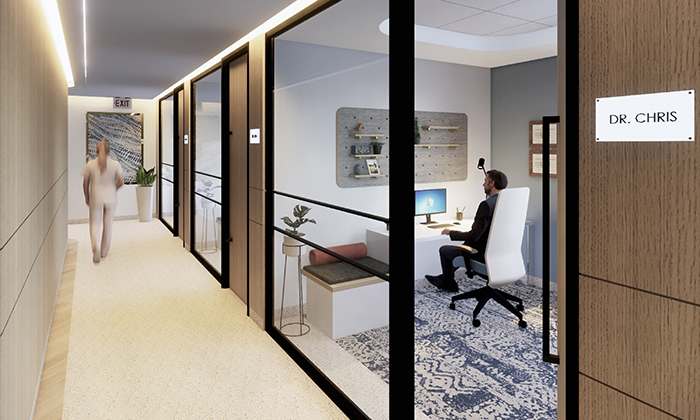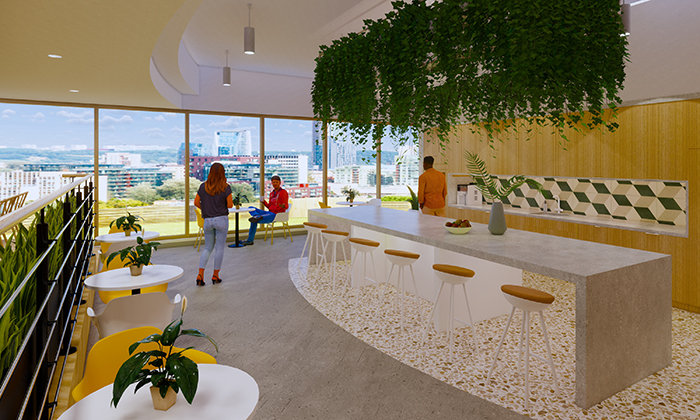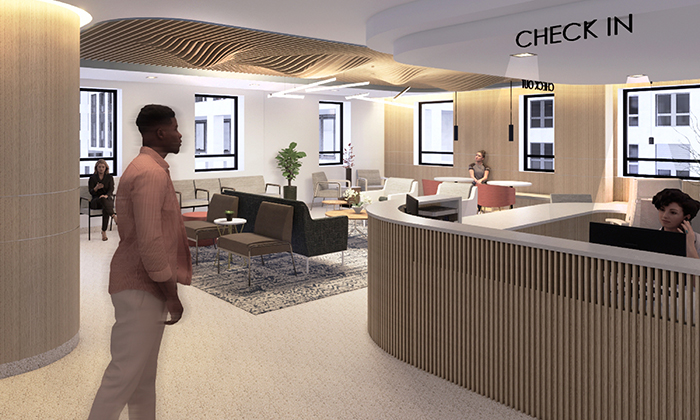Nicolas Swaner, a graduate student in Marymount University’s master’s program in Interior Design, has been included in Metropolis Magazine’s Future 100 List of the most talented students from the Class of 2021 in the best interior design and architecture schools in the United States and Canada.
The Future 100 List, which is in its inaugural year, not only recognizes the most promising and top-performing graduating students in these career fields across North America, but also serves as a connector of top talent with leading design firms. Details of selected Future 100 students are shared with recruiters from A&D (architecture and design) firms in order to foster relationships and create opportunities that will help awardees as they begin their careers.
“It still doesn’t feel completely real, but I’m just so humbly honored by the recognition,” Swaner said. “I’m currently working as a designer at Gensler’s D.C. office within the health and wellness area, and my next steps are to grow within this practice and train under their talented designers and architects.”
In late 2020, Swaner’s application was vetted on measures of creativity, rigor, skills and professionalism through his instructor’s nominating letter, his academic record and his portfolio of interior design work.
“Marymount’s Interior Design faculty could not be prouder of Nicolas and his accomplishments in our graduate program,” said Doug Seidler, Director of the University’s School of Design and Art and Associate Professor of Interior Design. “This national recognition confirms what we already know to be true – his thoughtful and responsive design solutions push boundaries and create inclusive spaces for people of all needs in a variety of settings.”
With a background and education in biology and cognitive psychology, Swaner says his approach to design relies heavily on an evidence-based design perspective and the “holistic use of biophilic design in order to redefine the built environment.” Biophilia refers to the theory that humans have an innate and instinctive connection to natural environments.
“I used to do research for zoos and aquariums, and my main area of study was abnormal behavior in a variety of captive species,” Swaner explained. “I found that their behavior was correlated to their captive environment, and this influence opened my eyes to new career paths as I discovered how my background in animal behavior and their physical environments could be used to benefit our own interior environments and promote wellness.”
His design portfolio, which spotlights three separate client projects, contains a local connection through the adventurous design of the World Wildlife Fund social media department’s new offices in Arlington, Va. The “Working Wildly” concept features a bold living wall in the main corridor and a hanging plant element meant to inspire employees with interesting ideas and creative opportunities.

Swaner’s portfolio also includes a renovation of Skyline Internal Medicine’s medical office in downtown Chicago, with the aim of creating a clinical space that feels more like a spa than a doctor’s office. Borrowed light, transparent partitions and curved corners allow natural light to wind through the environment, while warm oak paneled corridors evoke a sense of luxury. Gusty slat ceiling elements, inspired by the nickname of “The Windy City,” also illustrate movement.

Finally, his portfolio also showcases a design concept for Source Wellness & Day Spa in Jamestown, R.I., which incorporates a tranquil immersion of vernacular design elements with the functional needs of a large wellness facility.

Graduating students were eligible to apply for the Future 100 List if they are enrolled in an accredited interior design or architecture program in the United States or Canada and currently participating in final studio courses. They also were required to be working on studio-based or research-based projects and be in good academic standing, with a GPA of 3.0 or above.
To view the full Future 100 List, click here.
In addition to his Future 100 recognition, Swaner was announced as the first-place award winner in the International Interior Design Association’s (IIDA) 2021 Student Design Competition, which honors the talent and innovative thinking of interior design students and showcases emerging professionals in the interior design industry.
His Skyline Internal Medicine project once again demonstrated its broad design appeal:
“Openness and transparency were utilized to evoke the sense of trust between patients and providers. When patients are at ease and trusting, they are more likely to communicate their health needs with professionals. To accomplish this, the interior concept reduces the amount of partitions needed within the waiting area and places emphasis on corridor circulation. In doing so, patients and staff experience a sense of openness in an otherwise small footprint. Additionally, many of the partitions used within the space are glazed glass demountable walls. These partitions allow for patients to partially see into the provider workspace, demystifying the vagueness of provider workflow.”
Located just outside Washington, D.C., Marymount University’s Interior Design program offers undergraduate and graduate degrees for traditional students, career changers or experts seeking to advance their industry knowledge. With an interdisciplinary approach to design, Marymount develops qualified professionals with an emphasis on critical thinking and lifelong learning.







